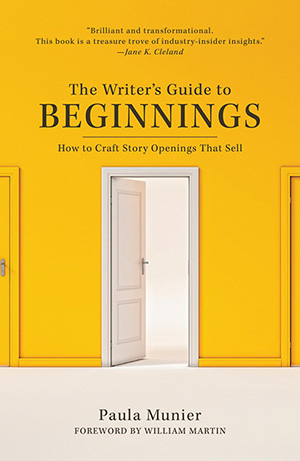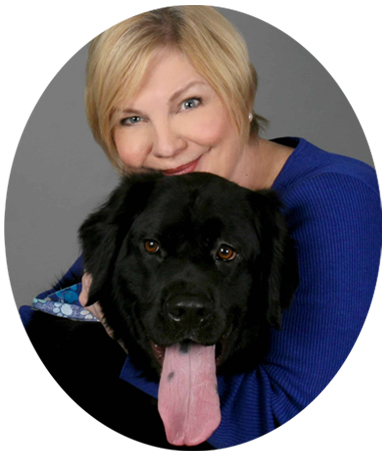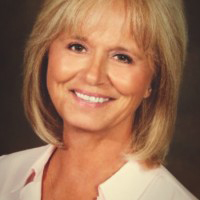
ike so many writers and readers who read and collect books, one of my favorite treasures is my library. My list of Must-Read-and-Buy books continues to grow. Needless to say, my bookshelves are overflowing (I can’t bring myself to part with them!), so, I am—again—in sore need of another bookcase. Sigh.
Seriously, though, if we writers want to learn and have the best chance of getting what it takes to get that revered book deal, first, we must read. Not only fiction, but nonfiction. I think I have as many nonfiction books on writing, and about writing, as I do fiction. Not only for my writing, but for my editing.
 One of my recent purchases, The Writer’s Guide to Beginnings by senior literary agent, Paula Munier, at Talcott Notch Literary is one I wished I’d acquired earlier on. The book, dog-eared and pasted with brightly colored sticky notes, is now constantly within reach. I kid you not.
One of my recent purchases, The Writer’s Guide to Beginnings by senior literary agent, Paula Munier, at Talcott Notch Literary is one I wished I’d acquired earlier on. The book, dog-eared and pasted with brightly colored sticky notes, is now constantly within reach. I kid you not.
Yes, we writers have been instructed ad nauseam on how to begin a story. But there’s a reason for that. Either nail the beginning of our story or expect our work to end up in that hated rejection pile with so many others. So, after studying her book, which also provided instruction on how she formed the first pages of her novel, A Borrowing of Bones, she hooked me, and I immediately bought the book. After that, I thought, why not see if Paula would be available to chat with me here at WOW!? And to my delight, she graciously agreed!
So, before we begin, I’d like to share some of Paula’s amazing talents. Not surprisingly, she’s held many notable careers in writing and publishing prior to taking on the title of literary agent at Talcott Notch Literary: journalist/reporter, editor, acquisitions editor, non-fiction author, novelist, and a USA Today best-selling author of the Mercy Carr series, of which, The Night Woods, the sixth book in the series is now available. The first Mercy Carr book, A Borrowing of Bones, was a Mary Higgins Clark nominee, and was also named as Dogwise Book of the Year, as was Blind Search, the second in the series. For anyone who loves dogs and cats and nature and mysteries, the Mercy Carr series is a must read.

WOW: Hello, Paula, and thank you so much for taking the time out of your busy schedule to talk with me today. I’m sure our readers here at WOW! can learn so much through your experiences. With all your previous writing and publishing credentials, how have these many careers helped you as a literary agent, and, for you, what is the best part about being a literary agent?
Paula: Thanks, Donna, for having me here at WOW! I appreciate the opportunity. Well, everything I’ve done, from my days as a young reporter forward, has helped me learn to tell and sell stories. I’ve always loved words and stories in all forms, and so my time in publishing has been more a calling than career. Sitting in different seats at the table—whether as a reporter, acquisitions editor, nonfiction author, novelist, content strategist, agent—has broadened my perspective and deepened my understanding of every aspect of the publishing business. Also, I love being a literary agent because, like being an acquisitions editor, it means that I am the midwife, helping writers bring their stories into the world. It’s like being an acquisitions editor—without the interminable meetings...
WOW: I am especially intrigued that you likened yourself to a “midwife.” I’d never thought of that analogy before. In essence, one of your many hats as a literary agent, then, is to guide a writer before, during, and after they are accepted for publication. That’s awesome! With that thought in mind, what can an author expect from you once they are signed with Talcott Notch? Also, what do you expect from the author?
Paula: I sign writers who are in for the long haul, who love to write and understand that revision is a necessary part of the process. I want to work with writers who have a strategic approach to their careers—and it’s my job to help them plan and execute that strategy.
WOW: Your comment that revision is necessary reminds me of Ernest Hemingway’s quote, “The only kind of writing is rewriting.” This brings to mind that many more manuscripts are rejected rather than accepted for publication. Why is that? Any suggestions on what a writer should consider before submitting their manuscript?
Paula: One of the biggest mistakes writers make is sending out their work too soon. The bar is very high in terms of craft; you’re competing against the most accomplished authors working in your genre—not just your fellow debut authors. And there are only so many open spots on a publisher’s lists for debuts. So, you need to study your competition and master your craft. The writers who get published are the ones who finish, revise, and persist.
WOW: I hadn’t, perhaps like other writers, considered that publishers only have so many spots open to debut authors. So, it’s evident that all writers, not just debut authors, need to take their craft to a higher level to be in the running for publication. With that thought in mind, I imagine in the course of your day at Talcott Notch, you read lots of manuscript submissions. For any writer, debut writers included, when reading a submission, how far into a submission do you read before you “know” you don’t want to continue reading?
Paula: As soon as I know I can’t sell it, I stop reading. That may happen right there on the first page because if a writer hasn’t grabbed me then and there, I know that the writer 1) is not ready for prime time and/or 2) has written the kind of story I know I’ll have difficulty selling.

“There are only so many open spots on a publisher’s lists for debuts. So, you need to study your competition and master your craft. The writers who get published are the ones who finish, revise, and persist.”
WOW: So, some manuscripts, even though they may be good, still might be a difficult sell. I’m sure that as a literary agent, keeping your finger on the pulse of the publishing world is a must to know what will sell. Are you seeing any trends in the industry right now? Ones that are easy sells? Any that lean toward a particular genre, sub-genre, or topic, fiction or nonfiction?
Paula: You talk about the fickle world of trends at your peril! That said, as I write this, nonfiction of all kinds is hot. Horror is hot. Romantasy is hot. Even dark academia. There’s also a resurgence of noir as well as traditional mysteries, police procedurals, and near-future thrillers.
WOW: It’s great to hear that there are so many opportunities in different genres for writers to catch an agent’s eye. In nonfiction, it’s known that agents and publishers prefer a query, even before a manuscript is submitted. What is the best way to submit a nonfiction query? On that note, too, today there are a multitude of memoirs by celebrities being published. For a writer who is an unknown and they are writing their memoir, what would entice you to accept their memoir?
Paula: When querying a nonfiction proposal, writers should be sure to have a good book proposal and a strong organizing principle. Also, memoirs are a very tough category if you’re not a Kardashian or a former president or big-time influencer. That said, if you write beautifully and you have a strong hook, you might sell it.
WOW: At every turn here, Paula, you offer definitive ways for writers to become better at their craft. Thanks for sharing the links to writing a book proposal and using an organizing principal that works in any genre “to frame what happens in your story.” These guides will certainly better help writers craft a submission. Of course, as you mentioned previously, if you can’t sell it, you move on. But, when you have accepted a manuscript for publication, whether nonfiction or fiction, what does an author need to do to exchange their “writing hat” for their “marketing hat?” How can they help you sell their book?
Paula: For nonfiction, you need a platform. End of story. For fiction, you need to be willing to work with your publisher on marketing and PR, which typically includes website, newsletter, events, blog tour, podcasts, and more. You need to show that you are part of your writing community and ready to do the work required to transition from writer to author.
WOW: These other elements needed by writers may be an eye-opener for many. In essence, though, they are merely switching writing gears in order to gain an audience, sell themselves, and their book. With that, I’d like to switch gears here as well. Since the COVID pandemic, have you seen a change in how readers are reading and buying their books, i.e., ebooks, audiobooks, paperback, hardcover? Do you think the trends you see now will continue into the next year? Maybe in five years?
Paula: Book sales soared during the pandemic as many people rediscovered their love of reading. But it was backlist sales; readers were looking for comfort readers by their favorite writers. Frontlist is back, but what’s selling now is high concept, across all categories. I don’t see that changing anytime soon.
WOW: It certainly isn’t surprising that high-concept stories remain high on a reader’s (and movie-goer’s) list. I, too, love books that carry the story over to the theatre. (Harry Potter and Jaws comes to mind). However, other than these types of high-concept story lines, are there any other you’d like to see, but have yet to find in either fiction and nonfiction?
Paula: Yes! I’d like to see stories in which nature plays a strong role, as in Unlikely Animals by Annie Hartnett and Remarkably Bright Creatures by Shelby Van Pelt or anything by Richard Powers.
WOW: You’ve just given me—and probably many of our readers—two more books to add to our ever-growing list of must reads! Ok, so now I’d like to address another topic: Submissions. It’s well known that writers should research not only an agent but the submission guidelines for a particular literary agency. In looking at Talcott Notch Literary submission guidelines, I see that first, writers are only to send a query and the first ten pages. Do you look at the query first, or just begin reading the pages? And, even if the story is good, is there anything that would keep you from accepting the manuscript?
Paula: I read the query first, but if it’s terrible, I don’t hold it against the writer, and I go on to the pages. If the pages engage me, and I think it’s the kind of story I can sell, I request a longer partial or a full manuscript. Writing a query is writing a pitch, and the sooner you learn to do that, the better.

“What’s selling now is high concept, across all categories. I don’t see that changing any time soon.”
WOW: So, not only do we need to learn how to write a good story, it’s critical we learn how to pitch that story. For many of us, pitching a novel is a struggle. It’s tough to narrow down a 250-plus-page novel into a few sentences. I think your straight-to-the-point Elevator Pitch formula will be extremely helpful, so thanks for including that link to share with our readers. Ok, so you’ve accepted a manuscript for publication. What are the next steps toward actual publication? What is the timeline before a book hits the market? Also, what can authors expect from you with editing and marketing?
Paula: It depends on how much work the manuscript needs. I was an editor for nearly twenty years, and I won’t shop any story until I think it’s ready. Which means revisions can take as little as thirty days or as long as a year. When it comes to marketing and more: To mix metaphors, we can help show our clients the ropes, but it’s up to them to take the ball and run with it.
WOW: As for myself and other writers as well, it’s encouraging to know that even though we have more work to do, we have continued support. On another note, I know some writers who've received full manuscript requests from agents, and they've been waiting for months to hear back. How long does it typically take to respond? Does a longer response time mean you aren’t interested, or just busy?
WOW: To be honest, it takes forever. Because our first duty is to our signed clients. I’m always (months) behind, so I tell writers to pester me nicely once a week. That helps.
WOW: Since your schedule is so demanding, are you able to attend conferences in order to connect with more writers? If so, any recommendations for first-time conference goers, so they get the most out of their time and finances?
Paula: I love conferences because I get to see old friends, meet new friends, and meet with editors over martinis instead of Zoom. They’re great for networking and learning tips and tricks and getting inspired. There are all kinds of conferences; you should at least go to your regional conferences as well as one or two of your genre conferences. Again, it’s important that you show publishers that you are part of the writing community. Because the first people to buy your book once published besides your mother will be your writer friends.
WOW: Paula, the breadth of your writing and publishing knowledge you’ve shared with me today is certain to help our readers learn more about their craft and what to expect when submitting and having their work published. So, thank you so much for taking the time to speak with me. Do you have any last words of encouragement or advice you would like to pass along to all writers who hope to get their work published with Talcott Notch?
Paula: The easiest way to get an agent/editor/book deal is to write a wonderful book. One that we can’t forget, one that haunts us until we sign you....
My sincere thanks to Paula Munier, Senior Agent at Talcott Notch Literary, for taking time out of her busy day to chat with me. The woman is a powerhouse, and to say she is an inspiration is an understatement. Using Paula’s elevator pitch suggestions, I’m now working on a new query for my YA historical novel. Also, even though Paula is currently closed to unsolicited queries, she will continue to request work through conferences and boot camps and to accept referrals. (She is on the 2024 faculty of the Write to Pitch Conference in New York this December if you want to check it out). You can learn more about Paula at talcottnotch.net, or at her website, paulamunier.com. Check out other classes taught by Paula and other agents here.
***

Donna Judith Essner lives and writes in sunny Florida’s sandy-beach panhandle. She has held positions as a university press associate editor, a small press acquisitions editor of several award-winning non-fiction and fiction works, and currently is a freelance editor. Her days are spent penning and editing her own manuscripts (two historical YA, and has just begun her first mystery novel), and freelance editing manuscripts. Her work has been published in newpages.com, Big Muddy: A Journal of the Mississippi River Valley, and Faulkner and Chopin, This is her first submission to WOW! Women on Writing. She is a member of SCBWI, Women’s Fiction Writer’s Assn, Emerald Coast Writers, Sisters in Crime (SinC), and Mystery Writers of America (MWA).